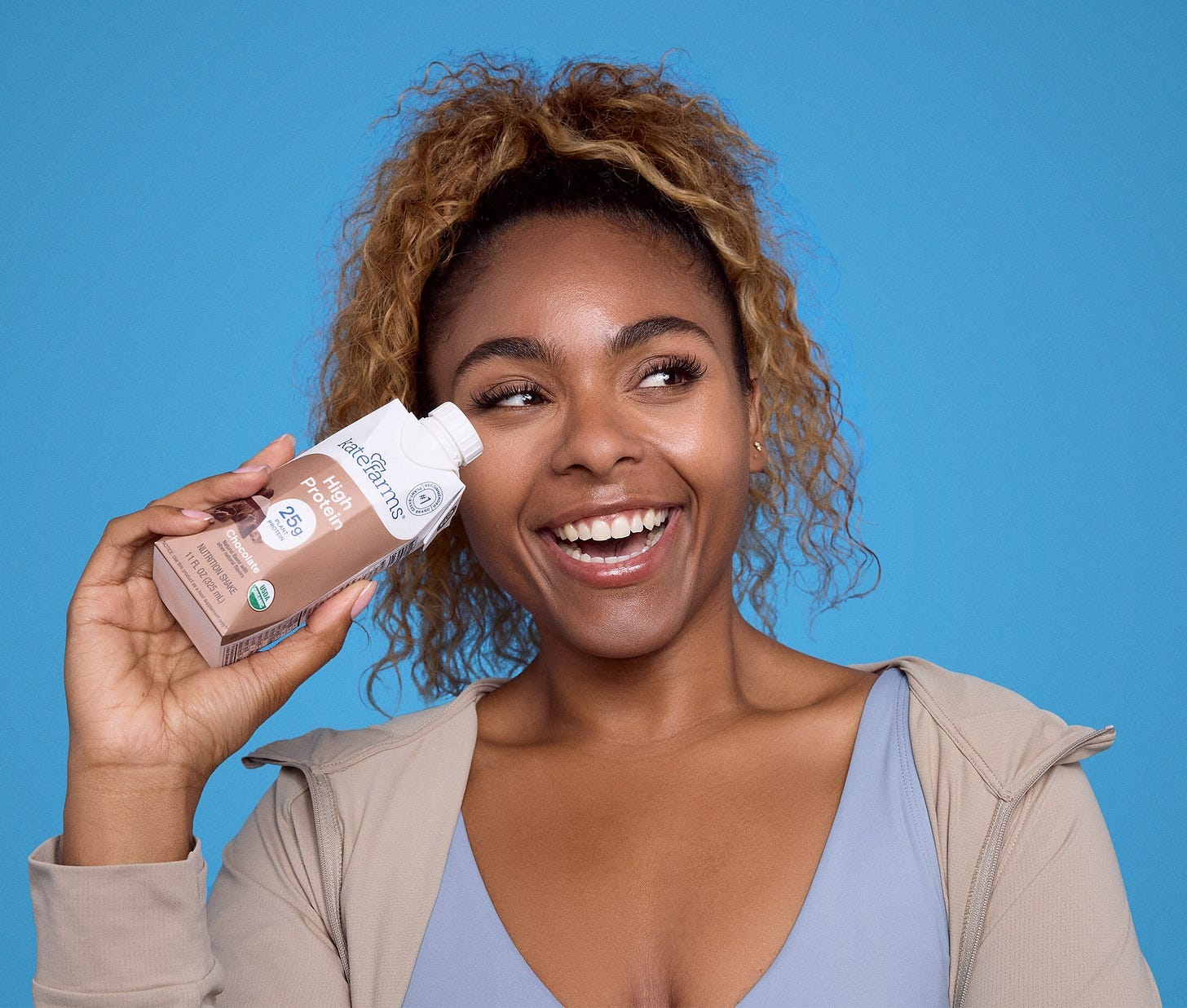The Gut Punch Weekly #27
The hidden protein opportunity, Ozempic may treat addiction cravings, Hengrui's new drug achieves 18% weight loss, Hims is the king of knockoff Ozempic, and more!
The Protein Gold Rush
The protein gold rush has CPG brands adding whey to everything from candy bars to pasta sauce. Convincing healthy people they need 40 grams of protein in their morning coffee can hardly be considered innovation. Companies are creating solutions for problems that don’t exist while ignoring a real, substantially more promising and profitable opportunity.
This explosion of high-protein everything is driven by influencer marketing and social media trends. Brand companies – essentially marketing entities that own no factories or equipment – ride these trends by contracting out production. When the trend fades, they’ll simply launch new brands to chase the next fad.
Meanwhile, ingredient suppliers invested heavily in protein production capacity to meet this hype-driven demand are now in desperate search of new applications. Most recently, the plant-based boom left these companies with specialized facilities, advanced protein processing capabilities, and long-term supply contracts, but plateauing demand.
The companies that are actually responsible for making real things in the real world – i.e., ingredient suppliers and co-manufacturers – have learned to serve whatever trend brand companies are chasing this quarter. They invest just enough capacity for today’s fad, knowing tomorrow will bring something different.
But this dynamic constrains genuine innovation. Why develop precise purification systems that maintain functionality when your customers’ marketing departments only care about riding the current hype train?
Current and former GLP-1 users are real people whose quality of life is directly tied to the food they consume. They need nutritionally dense food, not products plastered with meaningless claims.
For companies tired of chasing fads, this represents something rare: medical need driving sustained demand. This is the market that justifies real innovation – where functionality and clinical outcomes matter more than marketing claims, where customers will pay premiums for products that actually work.
Read the full article, co-authored with David Goulder, in The Hidden Protein Opportunity.
Top Stories
1) Ozempic Shows Promise in Treating Addiction Cravings
An elite rehab center, Caron Treatment Centers, is pioneering the use of GLP-1 drugs like Ozempic off-label to reduce cravings and treat various addictions.
Caron reports striking anecdotal success in obliterating urges for a wide variety of substance use disorders and addictive behaviors.
Despite growing enthusiasm and patient interest, the approach remains experimental, with limited clinical trial data.
There remains significant uncertainty about whether results can be replicated outside controlled, high-end treatment environments.
(STAT)
2) Hengrui's New Drug Achieves 18% Weight Loss
Hengrui Pharma's GLP-1/GIP receptor dual agonist, HRS9531, achieved a mean weight loss of up to 17.7% at 48 weeks in a phase 3 trial, with 88% of patients losing at least 5% of their body weight.
The safety profile was favorable, with most treatment-emergent adverse events being mild to moderate and primarily gastrointestinal-related.
The drug's performance is comparable to Eli Lilly's Zepbound, and Hengrui is now accelerating efforts to seek approval in China as soon as possible.
If approved, HRS9531 would join Innovent's mazdutide as another homegrown obesity treatment in the Chinese market, potentially offering more options for patients seeking weight loss solutions.
Kailera Therapeutics, Hengrui's U.S.-based partner, plans to investigate higher doses and longer treatment durations in global trials to explore the drug's full potential.
3) Hims Dominates Knockoff Weight-Loss Drug Market
Hims & Hers Health has emerged as a dominant player in the market for generic and compounded alternatives to popular GLP-1 weight-loss drugs.
Hims' rapid growth is part of a booming market for copycat obesity drugs that’s emerged as Americans seek lower-cost alternatives to name-brand medications.
Under CEO Andrew Dudum's leadership, the telehealth giant capitalized on surging demand for affordable weight-loss treatments that rival big pharmaceutical brands.
Dudum, who personally microdoses GLP-1s and uses AI for medical advice, embodies the fast-and-loose Silicon Valley entrepreneurial mold.
GLP-1 Industry Intel
Hims & Hers Expands to Canada with Generic Semaglutide: Hims & Hers is exploiting Novo's self-inflicted Canadian patent expiration to launch affordable generic semaglutide weight loss treatments in Canada.
WeightWatchers Relaunches with Wegovy Strategy and New Leadership: Following its bankruptcy reorganization, WeightWatchers is pivoting to integrate GLP-1 medications into its business model and diversifying into menopause care to revive its declining revenues.
Survey Shows GLP-1 Users Worried About Muscle Loss: A recent Veru survey reveals significant concerns about muscle loss among GLP-1 users, with 36% rating their perceived risk as moderate to very high, particularly among older adults.
Food & Wellness Industry Intel
Kate Farms Targets GLP-1 Users with High-Protein Shakes: Danone expands its presence in the growing high-protein beverage market with Kate Farms' launch of clinically-developed, plant-based shakes targeting GLP-1 medication users.
Ozempic Effect Disrupts Business from Airlines to Apps: GLP-1 weight loss drugs like Ozempic and Wegovy are disrupting industries beyond food and beverages, affecting everything from casino apps and retail to airlines and fitness centers as they alter consumer behavior and spending patterns.
GLP-1 Drugs Change How Food Tastes: Research shows GLP-1 medications alter taste perception and brain responses to food, especially sugar, leading food makers to develop specialized products with enhanced umami flavors and protein-rich, portion-controlled options.
GLP-1 Medications Boost Popularity of Chewy Snacks: As GLP-1 weight-loss drug usage increases, consumers are gravitating toward chewy, texture-rich snacks that provide emotional satisfaction with fewer calories.
GLP-1 Drugs Drive Snack Industry's Functional Food Revolution: As GLP-1 weight loss drugs reduce appetite and change eating habits, food manufacturers are pivoting to create nutrient-dense, functional snacks and mood foods that deliver more benefits in smaller portions.
Nationwide GLP-1 Step-Down Program Launched by Ciba Health: Ciba Health has launched the nation’s first GLP-1 Step-Down Program to help patients safely transition off weight loss drugs like Ozempic by addressing underlying metabolic health with personalized, data-driven care.
Frontline Focus
Weight Loss Drug Prescriptions Surge in Children: A study of over 310,000 health records reveals a significant surge in youth GLP-1 prescriptions after new pediatric guidelines, though overall medication use remains below 10% of patients.
Cigna Expands Low-Copay Access to Weight Loss Drugs: Express Scripts, Cigna's pharmacy benefit manager, announced it will expand access to popular GLP-1 weight-loss drugs with copays as low as $25 monthly for eligible patients with obesity plus diabetes or cardiovascular disease.
Ozempic Still Effective Despite Treatment Interruptions: A new study reveals that people taking GLP-1 drugs like Ozempic can still achieve significant weight loss even with medication disruptions, losing 14% of their body weight compared to 17% in those without interruptions.
GLP-1 Medications Require Lifestyle Changes for Best Results: Doctors emphasize that GLP-1 medications like Ozempic and Wegovy, while effective for weight loss and diabetes management, should be combined with proper nutrition and exercise rather than viewed as a standalone solution.
GLP-1 Drugs Linked to Increased Risk of Vision Loss: A Canadian study reveals that elderly diabetics taking GLP-1 drugs face twice the risk of developing neovascular age-related macular degeneration, potentially due to the medications' effects on retinal GLP-1 receptors.
GLP-1 Clinical Insights
Hormone Therapy Boosts Tirzepatide Weight Loss in Menopause: Mayo Clinic researchers found that postmenopausal women who combined hormone therapy with tirzepatide were more likely to achieve significant weight loss, with 45% reaching at least 20% total body weight reduction compared to 18% using tirzepatide alone.
Weight Loss Drugs May Naturally Boost Men's Testosterone: A new study suggests popular weight-loss medications like Ozempic and Tirzepatide can help restore normal testosterone levels in men with obesity or Type 2 diabetes without requiring hormone replacement therapy.
The Bleeding Edge
DNA Edit Makes Body Produce Anti-Obesity Hormone: Scientists successfully used in vivo genome editing to enable sustained secretion of the GLP-1 receptor agonist Exendin-4 from liver cells, effectively treating obesity and pre-diabetes in mice with a single administration.
Weight Loss Drug Mounjaro Shrinks Breast Cancer Tumors: Scientists at the University of Michigan discovered that tirzepatide, a popular weight-loss medication, significantly decreased both body fat and tumor size in obese mice with breast cancer.






